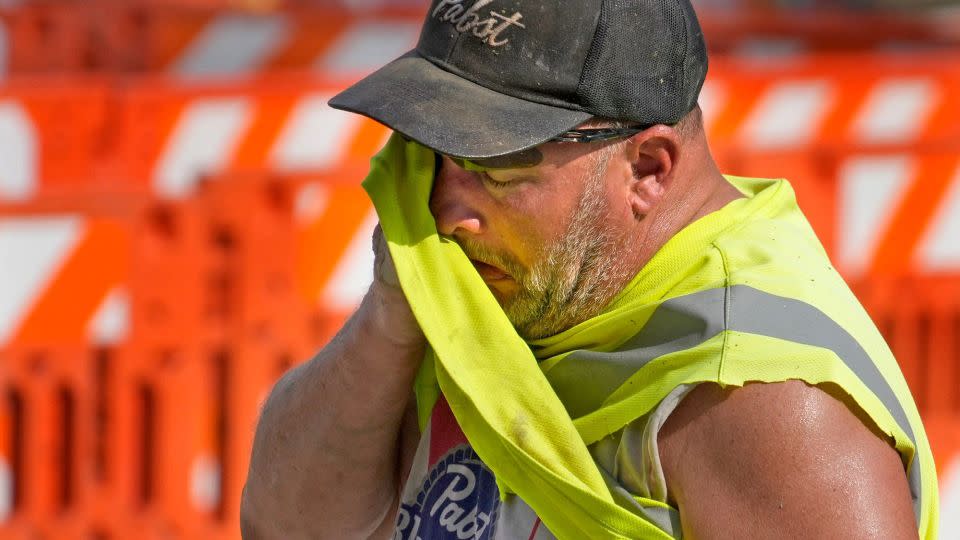It was a shock when Michael Mosley, a doctor and well-known TV presenter in the UK, was found dead earlier this month after hiking in scorching temperatures on the Greek island of Symi.
But it is now one of a series of tourist deaths and disappearances in Greece as the country faces a powerful early summer heat wave, with temperatures exceeding 40 degrees Celsius (104 degrees Fahrenheit).
On Saturday, a Dutch tourist was found dead on the island of Samos. The next day, the body of an American tourist was found in Mathraki, a small island west of Corfu. Albert Calibet, another American tourist, has been missing since he went hiking in Amorgos on June 11. And two French women disappeared in Sikinos after going for a walk.
The bodies of those who died still need to be examined to establish the precise cause of death, but authorities are warning people not to underestimate the impacts of the scorching temperatures.
“There is a common pattern,” Petros Vassilakis, police spokesman for the south Aegean, told Reuters: “everyone went on a walk in high temperatures.”
Some scientists say what is happening in Greece is a warning sign about the impacts of extreme heat on the body, and in particular on the brain, potentially causing confusion, affecting people’s decision-making ability and even their perception of risk.
As climate change fuels longer, more severe heat waves, scientists are trying to figure out how our brains will cope.
The brain is ‘the master switch’
Research has traditionally focused on the impact of extreme heat on muscles, skin, lungs and the heart, but “the brain, for me, is the key to everything,” said Damian Bailey, professor of physiology and biochemistry at the University of Wales. of the South. It’s the body’s “master switch,” he told CNN.
It is in the brain that body temperature is regulated. The hypothalamus, a small diamond-shaped structure, acts as a thermostat. It performs a delicate dance to maintain the body’s internal temperature at or very close to 37 degrees Celsius (98.6 Fahrenheit). When it’s hot, the hypothalamus activates sweat glands and dilates blood vessels to cool the body.
But the brain works well within a narrow range of temperatures, and even small changes can affect it. Many people will be familiar with feeling sluggish and lazy on a hot summer day.
But as the heat increases, it can have serious effects, including reducing fluids in the body and decreasing blood flow to the brain, Bailey said. He compares the brain to a Hummer – it needs vast resources to function.
Tests he performed on research participants in an environmental chamber, where he increased temperatures from 21 to 40 degrees Celsius (about 70 to 104 Fahrenheit), showed a drop in blood flow to the brain by about 9% to 10%.
“That’s a big problem in terms of not putting enough fuel into an engine that runs at high speed all the time,” Bailey said.

And that has an impact. Extreme heat can disrupt typical brain activity, said Kim Meidenbauer, a neuroscientist at Washington State University. The brain networks that normally allow people to think clearly, reason, remember, and construct and formulate ideas can become “lost,” she told CNN.
It becomes more difficult to make complex decisions, such as which way to go on a hike – a decision that seems simple, but requires weighing up several different factors.
There is also evidence to suggest that people are more likely to make risky decisions and engage in impulsive behaviors when exposed to heat, she added.
An altered risk perception associated with impaired cognitive function can have very serious consequences. “You’re not just talking about the possibility of getting a little too hot and maybe getting a sunburn,” she said. “You’re talking about potentially life-threatening (situations), like making bad decisions, having your judgment clouded.”
Scientists are just beginning to unravel the range of impacts heat has on the brain, not just in terms of decision-making but also mood, emotions and mental health.
“Our understanding is really minimal,” Meidenbauer said. “It’s a big unknown right now.”
Who is vulnerable?
Some people are more vulnerable to heat than others. Elderly people, especially those over 65, are most at risk because their bodies don’t always thermoregulate as well. The people missing in Greece were around 50 years old or older.
Very young children and pregnant women also face a high risk, as do those with pre-existing conditions, including mental health problems.
But heat can be dangerous for anyone.
In 2016, a team of scientists followed 44 college students during a heat wave in Boston and found those without air conditioning. suffered significant declines in cognitive performance.
“No one is immune to the health effects of heat,” said Jose Guillermo Cedeño Laurent, one of the research authors and an assistant professor at the Rutgers School of Public Health. “Our brain is an extremely sensitive organ,” he said.
Someone who is in good shape, understands the dangers and carries plenty of water will still be playing if they decide to go on a hike in very hot temperatures, Bailey said.
“You make bad decisions and it could cost you your life.”
How to protect yourself
There are behavioral things people can do to protect themselves and reduce risk, experts say.
This includes not exercising during the hottest parts of the day, but rather going during the coolest parts of the day and seeking shade when possible. Wearing loose clothing and applying ice packs to the head and neck may also help.
Drinking water is vital and not just when you feel really thirsty, Bailey said. It is important not to reach a point where the body loses fluids faster than it can absorb them. Experts also recommend electrolyte drinks, which can help replace some of the fluids lost through sweating.


Use location-sharing apps, Meidenbauer said. “Make sure someone knows where you are.”
In the long term, regular exercise is important – as long as it’s not outdoors during the hottest parts of the day – as it can help the body thermoregulate. “The fitter you are, the more resilient you are to these climate and environmental stresses,” Bailey said.
It will take some time to unravel the exact causes of death of those who lost their lives in Greece, but there is still a lesson that can be learned from the tragedies, Bailey said.
“No matter how smart or fit you may think you are… if you are going out in temperatures of 40 degrees Celsius above, even if you are well prepared, you are rising to the challenge.”
CNN’s Stephanie Halasz and Issy Ronald contributed to this report.
For more news and newsletters from CNN, create an account at CNN.com











/cdn.vox-cdn.com/uploads/chorus_asset/file/23954840/acastro_STK061_hulu_01.jpg?w=300&resize=300,300&ssl=1)






















/cdn.vox-cdn.com/uploads/chorus_asset/file/25503559/Screenshot_2024_06_24_at_9.15.15_AM.png?w=150&resize=150,150&ssl=1)
